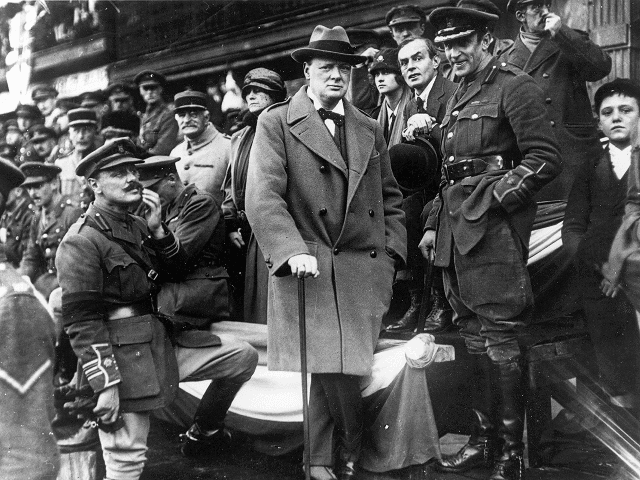Churchill College at the University of Cambridge hosted an online talk in which academics claimed that Winston Churchill was a white supremacist and the British Empire “far worse” than Nazi Germany.
In the Zoom “discussion” titled, arguably inaccurately, The Racial Consequences of Mr Churchill — as a knight of the realm the wartime leader’s proper title is ‘Sir’ rather than ‘Mister’ — academics Priyamvada Gopal, Onyeka Nubia, Kehinde Andrews, and Madhusree Mukerjee all appeared to share a profoundly negative view of the British leader.
Gopal, who gained a degree of public infamy after tweeting that “White Lives Don’t Matter. As white lives” in 2020 — over 20,000 people signed a Change.org petition calling for the India-born academic to be fired before the website took it down, but Churchill College instead promoted her to a full professorship — lead much of the “discussion”.
Her own initial contribution to it focused largely on attempting to justify why the uniformly anti-Churchill panel was not unbalanced, but she made it clear in the aftermath of the event that it is very much her view that Churchill was “manifestly” a “white supremacist”.
Onyeka Nubia began by tracing Churchill’s English fatherline to the 1400s and his American motherline to “Huguenot stock”, suggesting that this bloodline “helps us to understand much about the nature of ethnicity in the timeframe of which Churchill was born and lived… an ethnicity or an ethnic identity that is framed on a European hegemony that we might now say was a white supremacist philosophy.”
Nubia went on the critique Churchill’s use of the term “Anglo-Saxon race” in his books — “there is no such thing, of course” — and to accuse him of having “strong ideal about ethnicity and race” which were “particular to a kind of Anglophile, Eurocentric, white supremacist perspective”.
Madhusree Mukerjee, a Germany-based, Indian-born physicist who wrote a much-disputed book laying much of the blame for the Bengal Famine at Churchill’s doorstop, focused much of her talk on that humanitarian disaster — leaving the fact that much of the rice crop had been devastated by a cyclone and a catastrophic outbreak of fungal disease off her slides listing its causes.
Mukerjee also claimed that “Hitler was inspired by the British Empire” and that “militarism is at the core of the British identity”, saying of London’s historic monuments: “those statues need to come down”.
She also appeared to dismiss Britain’s role in the defeat of the Axis powers, saying “of course it was the Soviet Union that defeated the Nazis and the Americans who defeated the Japanese” — completely overlooking the vital contribution of British and Empire forces to the Arctic convoys, the D-Day landings, and the African and South-East Asian theatres.
Churchill’s sole personal contribution to the war effort, she surmised, was that if anyone other than him had been in Downing Street the Bengal Famine would have been less severe.
Both speakers dragged up politically incorrect remarks made by — or attributed to — Churchill, who was born in 1874, in an effort to prove his was alleged supremacist views, particularly with respect to Indians, but neither quoted his statement in 1943, the year of the Bengal Famine, that “The old idea that the Indian was in any way inferior to the white man must go. We must all be pals together. I want to see a great shining India, of which we can be as proud as we are of a great Canada or a great Australia.”
The star of the show, however, was Kehinde Andrews, media darling and Britain’s inaugural professor of “Black Studies” — now a familiar figure to many Britons, given the number of times he has been wheeled into television studios and academic venues to claim that the Englightenment was racist, that the patriotic song Rule, Britannia is racist, that British sportsmen should take a knee “or clench a fist” during the national anthem because the British flag is a symbol of “oppression” and Britain is racist, that the England flag should be scrapped because it is “offensive” and on par with “something like the Confederate flag in America”, and so on.
“I mean, really the argument that I wanna make is that if you think about Churchill there is no debate about his white supremacy,” Andrews began, convicting the wartime leader on that particular charge quickly and decisively.
“The question here is why does Churchill still hold the level of popularity he does… It’s almost like he’s been beatified, a saintly figure who’s beyond reproach,” Andrews went on, claiming that he “wasn’t even that popular at the time” and “was never elected”.
(Churchill was of course elected to the House of Commons many times, and, while Labour won the 1945 general election, he led the Conservative party back into government in the 1951 general election.)
“The argument I’m going to make here is that it’s because he kind of is the perfect embodiment of white supremacy,” said Andrews adding that “white supremacy is still the politics of the day” and that “the world is still governed by the same white supremacy [as] in Churchill’s day”.
He also reiterated his previously expressed view that “[T]he British Empire was far worse than the Nazis.”
“It lasted longer, it killed far many more people, and in fact, in many ways… Nazis were copying large elements of the British Empire,” he insisted, adding elsewhere that, in his view, the Holocaust was “not a novel thing” except for the fact that it was “brought to bear in Europe [on] people we would consider white”.
The Racial Consequences of Mr Churchill can be seen in full here.
Follow Jack Montgomery on Twitter: @JackBMontgomery
Follow Breitbart London on Facebook: Breitbart London
